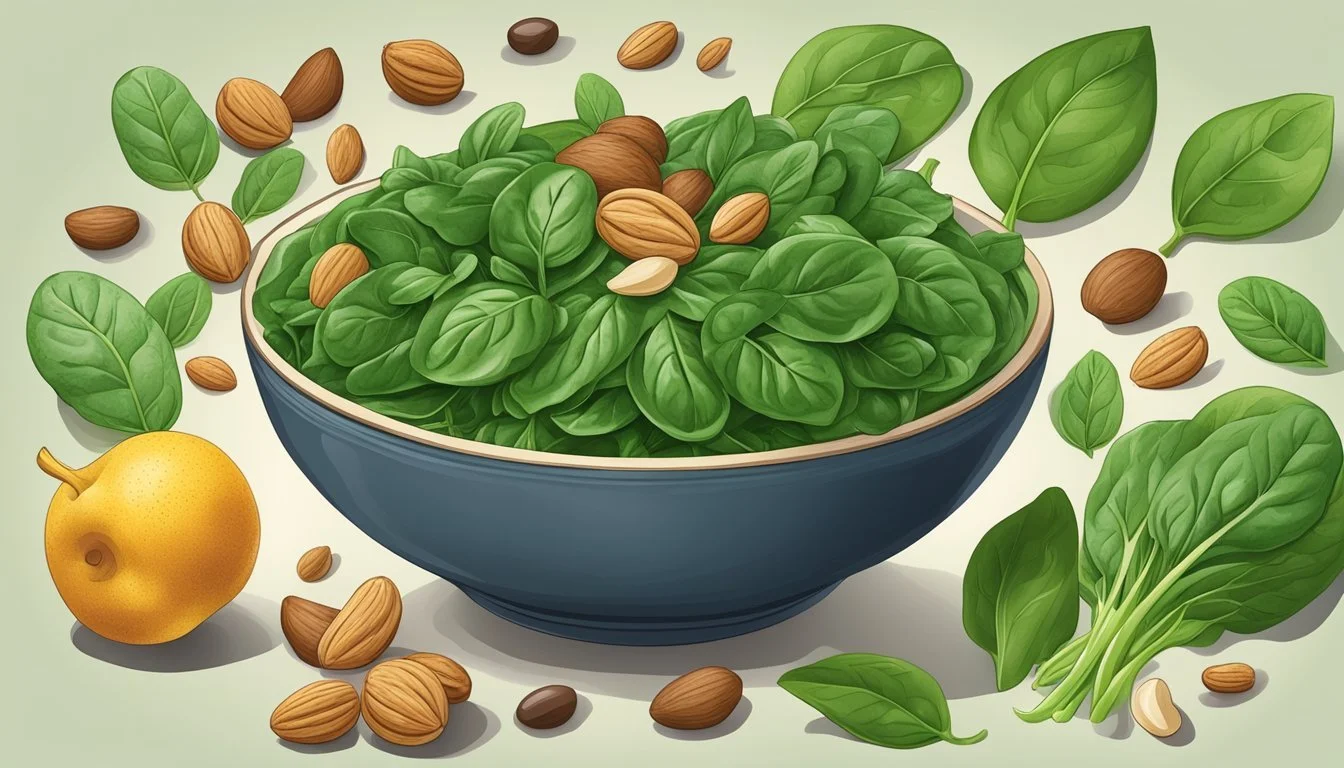Can Pregnant Women Consume Raw Spinach?
Unveiling Nutritional Facts and Safety Tips
Pregnant women are often advised to maintain a diet rich in essential nutrients for their own health and the development of their baby. Spinach, a leafy green vegetable, is packed with important vitamins and minerals, such as folic acid, iron, and calcium, which are highly beneficial during pregnancy. It is a versatile ingredient that can be incorporated into a variety of dishes, providing an easy boost of nutrients to the pregnancy diet.
However, while spinach is nutritious, whether it can be safely consumed raw during pregnancy is a question that requires attention. Raw spinach should be thoroughly washed to remove any potential contaminants that could harm the mother or the fetus. It's also worth noting that spinach contains a high amount of dietary fiber, which, although beneficial, may lead to digestive issues such as bloating and constipation if consumed in large quantities without proper adjustment.
To ensure that the consumption of raw spinach is safe, pregnant women are advised to buy fresh leaves and clean them meticulously. While cooking spinach is a method to eliminate any harmful bacteria, if choosing to eat it raw, strict hygiene practices are paramount. Balancing spinach intake with other foods and paying close attention to how one's body reacts is important in mitigating any adverse effects and making the most of the benefits spinach has to offer.
Nutritional Profile of Raw Spinach
Raw spinach hosts an impressive array of nutrients that are beneficial for health, particularly during pregnancy. It stands out for its rich vitamin and mineral content, which supports fetal development and maternal health.
Essential Nutrients and Vitamins
Spinach is an excellent source of vitamins such as Vitamin A, Vitamin C, Vitamin K, and several B vitamins including folate (folic acid in its synthetic form), which is essential for preventing neural tube defects in the developing fetus. Here's a brief overview:
Vitamin A: Vital for immune function and eye health.
Vitamin C: Important for skin health and immune function.
Vitamin K: Critical for blood clotting and bone health.
Folate (Vitamin B9): Essential for DNA synthesis and fetal growth. Pregnant women should aim for at least 400 micrograms per day.
Vitamin B6: Supports brain health and metabolism.
Spinach also contains antioxidants, which help protect the body against oxidative stress.
Mineral Content in Spinach
Spinach is rich in several minerals that are crucial during pregnancy:
Iron: A key component in hemoglobin, iron helps prevent anemia, a common condition during pregnancy.
Calcium: Supports bone development and may assist in maintaining blood pressure levels.
Magnesium: Plays a role in over 300 enzyme reactions in the body, including energy production and muscle function.
Potassium: Necessary for proper heart and muscle function.
A table summarizing the mineral content:
Mineral Importance during pregnancy Iron Prevents anemia, increases blood volume Calcium Bone development, may help regulate blood pressure Magnesium Enzyme function, energy production, muscle relaxation Potassium Muscle and heart function, fluid balance
Although spinach is nutrient-dense, it does contain oxalates, which can bind with minerals and reduce their absorption. To counteract this, consuming spinach with a source of vitamin C can help improve the absorption of these minerals.
Health Benefits of Spinach During Pregnancy
Spinach is a nutritional powerhouse for pregnant women, providing a range of essential nutrients that support both maternal health and fetal development. It is a versatile addition to a healthy diet that offers several benefits.
Supporting Fetal Development
Spinach is rich in folic acid, which is crucial for the proper development of the baby's brain and nervous system and helps to reduce the risk of birth defects. This leafy green also supplies vitamin E, which is important for the development of the fetal immune system and contributes to healthy bone development.
Preventing Anemia
During pregnancy, the volume of blood in a woman's body increases, requiring more iron to maintain hemoglobin levels. Spinach is a source of non-heme iron that, when combined with foods high in vitamin C, can help prevent anemia. Consuming spinach contributes to the production of red blood cells and helps to keep both the mother's and baby's energy levels stable.
Aiding Digestion and Preventing Constipation
With its high fiber content, spinach can aid digestion and help maintain regular bowel movements, thus preventing constipation—a common issue during pregnancy. Regular consumption of spinach contributes to a smoother digestion process, which is beneficial for both the mother's comfort and nutrient absorption.
Safety Concerns and Considerations
When considering the consumption of raw spinach during pregnancy, food safety is paramount. Potential risks such as foodborne illness and the impact of certain natural compounds necessitate careful consideration.
Risk of Foodborne Illness
Raw spinach can sometimes harbor harmful bacteria such as E. coli, Salmonella, and Listeria. These contaminants can lead to foodborne illnesses which are particularly dangerous during pregnancy. They may cause food poisoning symptoms like diarrhea, which, in severe cases, may increase the risk of miscarriage or harm the fetus. Pregnant women are advised to ensure that raw spinach is thoroughly washed or to opt for cooked spinach recipes to mitigate these risks.
Impact of Oxalate Content
Spinach is high in oxalates, compounds that if accumulated in large amounts, may lead to the formation of kidney stones. Consuming oxalate-rich foods in moderation is usually suggested to prevent stone formation. Moreover, spinach's oxalate content may affect the absorption of minerals like calcium, which is crucial for maintaining blood pressure. While spinach provides nutritional benefits, including iron, which may prevent gestational diabetes, balancing its intake is important to avoid potential side effects related to oxalate.
Consumption in Moderation
When discussing the inclusion of raw spinach in a pregnant woman's diet, the principle of moderation is paramount. Spinach is unquestionably rich in vital nutrients such as folic acid, which is essential for preventing birth defects of the brain and spine. However, too much of a good thing can lead to nutrient imbalances, which pregnant women should assiduously avoid.
A balanced diet during pregnancy means eating a variety of foods to get the right amounts of nutrients. In the case of raw spinach, this means incorporating it thoughtfully alongside other vegetables and food sources. While the natural folate in spinach is beneficial, pregnant women should ensure they are also meeting their nutritional needs through other foods and, when recommended, prenatal vitamins.
Benefits of Spinach:
High in folic acid
Source of iron, which can prevent anemia
Contains calcium that may help maintain blood pressure levels
The following are guidelines for including raw spinach in a pregnancy diet:
Wash Spinach Thoroughly: Always wash spinach to reduce the potential for contamination.
Balance Intake: Raw spinach should be consumed in conjunction with a variety of other foods.
Monitor Portions: Limit raw spinach to small portions within the daily diet.
Pregnant women should consult their healthcare provider regarding the optimal amount of raw spinach to include in their diet to ensure that they are not exceeding their daily requirements. This is especially pertinent for women who may be at risk of excessive iron or calcium intake.
By adhering to a diet that is varied and not overly dependent on any single food source, especially when it comes to raw vegetables, pregnant women can maintain a healthy diet that supports both their own well-being and the development of their baby.
Recommended Ways to Include Spinach in Diet
Pregnant women can safely incorporate spinach into their diets by ensuring it's clean and properly prepared to meet increased nutritional needs. Spinach offers vital nutrients beneficial during pregnancy, but it's essential to handle it carefully to avoid contamination.
Inclusion in Salads and Smoothies
Adding spinach to salads is a straightforward way to consume this leafy green vegetable. It can be paired with other pregnancy-safe ingredients like sliced avocado, seeds, and a variety of chopped vegetables to create a nutrient-packed meal. For salads, ensure that spinach is thoroughly washed to remove potential contamination. Preparing smoothies with spinach is another excellent option. Blending raw spinach with fruits and other greens like kale can result in a refreshing drink that fulfills a portion of the daily nutritional needs. Spinach juice can also be an alternative, mixing well with citrus or apple juices to enhance the flavor.
Salads:
Wash spinach thoroughly
Combine with avocado, seeds, and other safe vegetables
Dress with olive oil or other pregnancy-safe dressings
Smoothies:
Blend raw spinach with fruits (e.g., banana, berries)
Add other greens like kale for additional nutrients
Include juice or water to achieve the desired consistency
Cooking and Recipes
Cooked spinach reduces the risk of foodborne illnesses, making it safe to eat during pregnancy. It can be gently steamed, sautéed in olive oil, or added to recipes like omelets and stir-fries. Frozen spinach is a convenient alternative that requires minimal preparation and can be added directly to dishes like spinach soup or a vegetable dip. It's also beneficial to incorporate cooked spinach into pasta dishes or as a topping on pizzas and flatbreads, infusing meals with additional iron and folate, crucial for pregnancy.
Cooking:
Steam or sauté spinach to include in various dishes
Use frozen spinach as a convenient, ready-to-cook option
Mix spinach into pasta sauces or as a pizza topping to elevate nutrient intake
Recipes:
Add spinach to omelets or scrambled eggs for a protein-rich breakfast
Create a spinach-based dip with Greek yogurt or cream cheese for a healthy snack
Prepare a nourishing spinach soup as a warm and comforting meal
Alternative Sources of Essential Nutrients
For pregnant women who may need alternatives to raw spinach, a variety of nutritious options are available that provide key vitamins and minerals necessary for prenatal health.
Other Leafy Greens and Vegetables
Leafy greens other than spinach provide a wealth of nutrients vital for pregnancy. Kale and Swiss chard are excellent choices, offering high levels of vitamins A, C, and K, as well as calcium and iron. These greens can be consumed cooked or raw in salads. For a beta-carotene boost, similar to that found in spinach, pregnant women can turn to carrots and sweet potatoes.
Kale: Vitamin K (1 cup: 684% DV*), Vitamin A (1 cup: 206% DV), Calcium (1 cup: 9% DV)
Swiss Chard: Vitamin K (1 cup: 636% DV), Vitamin A (1 cup: 60% DV), Iron (1 cup: 22% DV)
Carrots: Beta-Carotene (1 cup: 120% DV), Vitamin A (1 cup: 400% DV)
Sweet Potatoes: Beta-Carotene (1 cup: 184% DV), Vitamin A (1 cup: 192% DV)
*DV: Daily Value
Seeds, Nuts, and Legumes
Seeds and nuts are compact nutrient powerhouses for expecting mothers. Chia seeds, flaxseeds, and walnuts offer essential fatty acids, while legumes such as lentils and chickpeas supply fiber, protein, iron, and phosphorus. It’s important for pregnant women to include these in their diets as they not only contribute to the nutrient requirements but also support fetal development.
Chia Seeds: Omega-3 Fatty Acids (1 ounce: 4915 mg), Phosphorus (1 ounce: 27% DV)
Flaxseeds: Omega-3 Fatty Acids (1 tablespoon: 1597 mg), Vitamin B1 (1 tablespoon: 20% DV)
Walnuts: Omega-3 Fatty Acids (1 ounce: 2542 mg), Phosphorus (1 ounce: 10% DV)
Lentils: Folate (1 cup: 90% DV), Protein (1 cup: 18 grams)
Chickpeas: Protein (1 cup: 14.5 grams), Phosphorus (1 cup: 45% DV)
Inclusion of these foods can complement prenatal nutrition effectively, providing essential nutrients for both the mother and the growing fetus.
Consulting Healthcare Professionals
When considering the inclusion of raw spinach in a pregnancy diet, consultation with a healthcare professional is paramount. They possess the expertise to guide expectant mothers through the benefits and possible side effects of consuming spinach during pregnancy.
Benefits of Spinach During Pregnancy:
Folate: Essential for fetal development, spinach provides folate which aids in preventing neural tube defects.
Dietary Fiber: Spinach is high in fiber, promoting digestive health and potentially managing gestational diabetes.
Iron: A crucial mineral for preventing anemia, a common condition in pregnancy due to increased blood volume.
Side Effects and Considerations:
Food Safety Risks: Healthcare professionals can offer advice on reducing the risks associated with consuming raw vegetables, such as proper washing techniques to eliminate potential contaminants.
Immunity Concerns: Spinach contains nutrients that support the immune system, but a healthcare professional can provide tailored advice to ensure an expectant mother’s immunity is optimally supported.
When conversing with healthcare professionals, expectant mothers should discuss:
Personal dietary requirements
Current health conditions
Historical reactions to specific foods
Pregnant women are encouraged to establish an open dialogue with their healthcare provider to ensure their diet supports both their health and the health of their developing baby.
FAQs About Eating Raw Spinach During Pregnancy
Expectant mothers often question the safety of consuming raw spinach during pregnancy. This portion of the article focuses on addressing these concerns, separating fact from fiction, and providing reliable information on nutritional aspects and the potential risk of foodborne illnesses.
Addressing Common Concerns
Can pregnant women safely eat raw spinach?
Yes, pregnant women can eat raw spinach, but it should be thoroughly washed to reduce the risk of foodborne illnesses such as salmonellosis. It is a nutrition-rich vegetable that supplies vital nutrients like folic acid, important for fetal development.
What are the nutritional benefits of raw spinach for pregnant women?
Spinach is rich in folic acid, iron, calcium, and other essential nutrients that support both maternal health and fetal development. It is advisable to consume raw spinach in moderation due to its high fibre content, which can cause gastrointestinal discomfort if consumed in large amounts.
What about the risk of pesticides in raw spinach?
Pregnant women should ensure that raw spinach is organically grown or properly washed to reduce pesticide exposure. The risk associated with pesticides can be minimized by peeling, cooking, or purchasing organic produce when available.
Myths vs. Facts
Myth: Pregnant women should avoid raw spinach due to the risk of foodborne illness.
Fact: While there is a risk, proper handling and washing of raw spinach can significantly reduce it. Pregnant women do not have to avoid raw spinach entirely but need to be cautious about hygiene.
Myth: Eating raw spinach will provide the baby with all necessary nutrients.
Fact: While raw spinach is nutrient-dense, a balanced diet with a variety of vegetables is important for providing all the nutrients that both the mother and the developing baby need.









